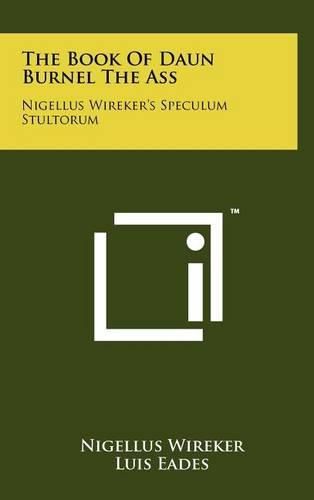Readings Newsletter
Become a Readings Member to make your shopping experience even easier.
Sign in or sign up for free!
You’re not far away from qualifying for FREE standard shipping within Australia
You’ve qualified for FREE standard shipping within Australia
The cart is loading…






The Book of Daun Burnel the Ass: Nigellus Wireker's Speculum Stultorum is a medieval Latin text written by Nigellus Wireker. The book is a satirical commentary on society and human folly, using the character of Daun Burnel, a foolish and stubborn donkey, as a metaphor for human behavior. The text is divided into chapters that cover a range of topics, including politics, religion, and morality. Wireker's writing is marked by wit, irony, and a critical eye towards the flaws of his contemporaries. The book was widely read in the Middle Ages and remains an important example of medieval satire. This edition includes a modern English translation of the text.This scarce antiquarian book is a facsimile reprint of the old original and may contain some imperfections such as library marks and notations. Because we believe this work is culturally important, we have made it available as part of our commitment for protecting, preserving, and promoting the world's literature in affordable, high quality, modern editions, that are true to their original work.
$9.00 standard shipping within Australia
FREE standard shipping within Australia for orders over $100.00
Express & International shipping calculated at checkout
The Book of Daun Burnel the Ass: Nigellus Wireker's Speculum Stultorum is a medieval Latin text written by Nigellus Wireker. The book is a satirical commentary on society and human folly, using the character of Daun Burnel, a foolish and stubborn donkey, as a metaphor for human behavior. The text is divided into chapters that cover a range of topics, including politics, religion, and morality. Wireker's writing is marked by wit, irony, and a critical eye towards the flaws of his contemporaries. The book was widely read in the Middle Ages and remains an important example of medieval satire. This edition includes a modern English translation of the text.This scarce antiquarian book is a facsimile reprint of the old original and may contain some imperfections such as library marks and notations. Because we believe this work is culturally important, we have made it available as part of our commitment for protecting, preserving, and promoting the world's literature in affordable, high quality, modern editions, that are true to their original work.